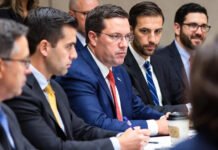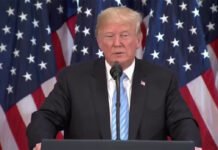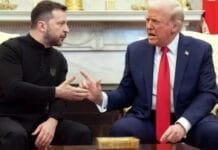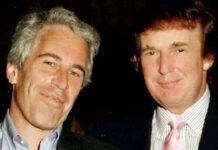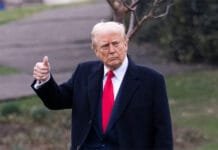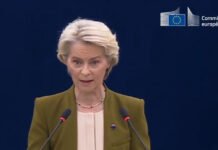The U.S. President Donald Trump stated, “My greatest legacy will be as a peacemaker and a unifier.” This statement encapsulates his political aspirations and the central tenets of his presidency, where he consistently emphasized peace, diplomacy, and unity, particularly in the context of his foreign policy achievements. Trump’s belief in peace-building and international cooperation formed the core of his approach to global relations, with significant outcomes that have left a lasting impact.
Trump’s Commitment to Peace: A Bold Statement for a Shifting Global Order
One of Trump’s defining goals during his tenure as president was to reshape the international landscape by focusing on peace and unity. His administration achieved several key milestones, particularly in the Middle East, which he often referred to as proof of his success as a peacemaker. This vision was not merely about ending conflicts but about fostering cooperation between historically adversarial nations.
The Abraham Accords: A Landmark for Peace
The Abraham Accords stand as one of the most significant achievements of Trump’s presidency, especially when it comes to peace-building efforts. Signed in 2020, these agreements between Israel and multiple Arab nations—the United Arab Emirates (UAE), Bahrain, Sudan, and Morocco—marked a monumental step towards regional stability. The Accords were hailed as a groundbreaking achievement in the Arab-Israeli conflict, which had long been considered one of the most intractable geopolitical issues in modern history.
By normalizing relations between Israel and several Arab states, the Abraham Accords opened up new opportunities for trade, tourism, technology collaboration, and security cooperation in a region historically divided by deep-rooted conflicts. Trump’s diplomatic push resulted in tangible outcomes, signaling his ability to engage directly with the leaders of both sides and bring them to the negotiating table.
Peaceful Negotiations with North Korea: A Different Approach to Diplomacy
Trump’s approach to diplomacy extended beyond the Middle East. His interactions with North Korean leader Kim Jong-un were emblematic of his belief in direct dialogue as a means to resolve long-standing global conflicts. While critics often dismissed the potential for real progress, Trump’s summits with Kim were revolutionary in their scope and ambition.
The decision to engage North Korea directly was a departure from the more traditional, diplomatic methods employed by previous administrations. Trump advocated for personal engagement over formalized, bureaucratic negotiations, emphasizing that sometimes, personal relationships could foster breakthroughs that traditional diplomacy might not achieve. The meetings in Singapore, Hanoi, and other locations were aimed at discussing denuclearization and regional security, although lasting results remain mixed. Nonetheless, they demonstrated Trump’s commitment to diplomacy as a tool for fostering peace in the most contentious global theaters.
America’s Global Role: Reasserting Power and Respect
Trump’s vision of peace was closely tied to his broader goal of reasserting America’s dominance on the world stage. According to Trump, one of his most significant priorities was to restore the United States to its rightful place as the most powerful and respected nation globally. He believed that under previous administrations, the U.S. had allowed itself to be diminished in terms of international influence and that it was crucial for America to reclaim its stature as a global leader.
Trump’s “America First” policy was a central component of his diplomatic approach, which focused on prioritizing U.S. interests in trade, security, and foreign relations. Through this policy, Trump sought to negotiate fairer trade agreements, demand more from international allies, and challenge existing global norms that he believed were unfair to the U.S.
The U.S. as a Defender of Human Rights and Hostage Diplomacy
One of Trump’s lesser-discussed but important legacies is his administration’s role in securing the release of hostages around the world. His personal involvement in negotiating the return of Americans and foreign nationals held in places like Syria, Iran, and North Korea showcased his commitment to humanitarian concerns. By bringing these individuals back to their families, Trump solidified his image as a leader who not only focused on geopolitics but also prioritized human rights.
This focus on hostage diplomacy underscored his broader foreign policy goals: to showcase American strength and commitment to its citizens and allies. He worked tirelessly to ensure that those held captive by extremist groups could return home safely, positioning the U.S. as a global protector of human rights.
Challenges and Criticisms of Trump’s Diplomatic Approach
While Trump’s foreign policy initiatives garnered praise from his supporters, his tenure was not without controversy. His critics often pointed to his unpredictable and combative approach to foreign relations. For instance, his decision to withdraw from the Paris Climate Agreement, the Iran Nuclear Deal, and his skepticism toward multilateral organizations like the United Nations and the World Trade Organization alienated some traditional allies and raised concerns about the future of global cooperation.
Critics also questioned Trump’s ability to balance his America First stance with the need for multilateral diplomacy. While his supporters believed his assertive approach was necessary for defending U.S. interests, detractors feared that it undermined crucial international partnerships and made the U.S. appear isolated from global efforts to address issues like climate change, nuclear proliferation, and global health.
Despite the criticisms, Trump’s supporters saw these moves as necessary to challenge what they viewed as unfair international norms. For them, his presidency was about standing up for American sovereignty and ensuring that the U.S. was treated fairly in the global arena.
A Lasting Legacy: Trump’s Aspiration to Be Remembered as a Peacemaker and Unifier
As Trump looks back on his presidency, he envisions a legacy defined by his role as a peacemaker and unifier. The Abraham Accords, his diplomatic initiatives with North Korea, and his efforts to restore America’s influence on the global stage will likely be central to how history remembers him. Trump’s bold assertions of peace and diplomacy—along with his vision for a united world—marked a significant departure from traditional U.S. foreign policy.
While Trump’s approach was not universally embraced, the impact of his foreign policy on the global order is undeniable. His administration succeeded in creating new diplomatic ties, securing the release of hostages, and challenging the existing global order to assert U.S. leadership. His vision for the future, rooted in peace, unity, and American strength, continues to resonate as the world adapts to new geopolitical realities.


